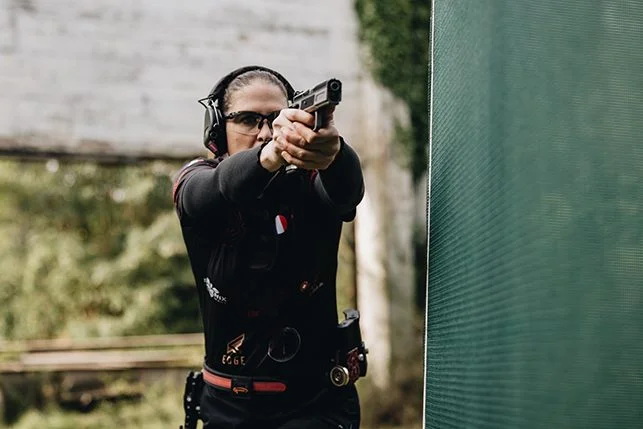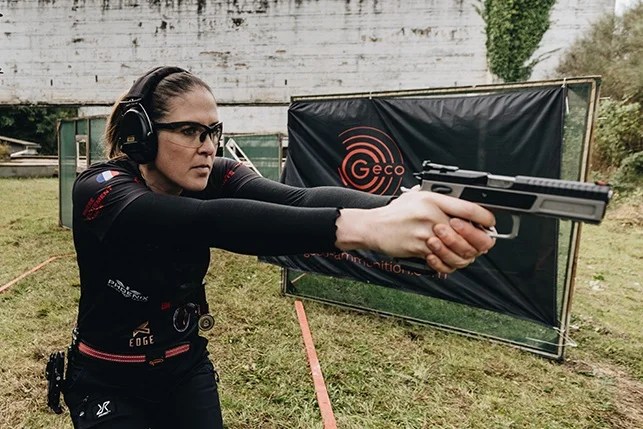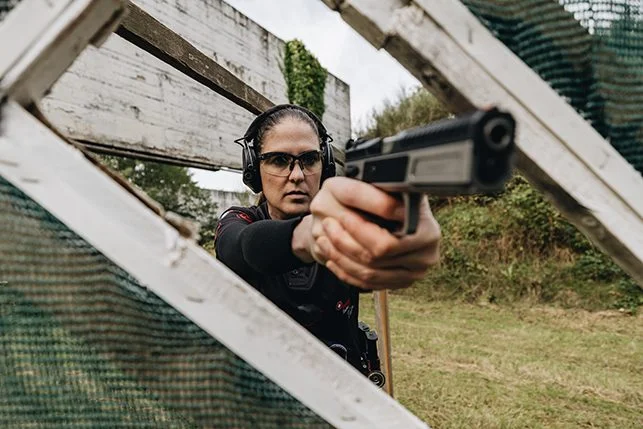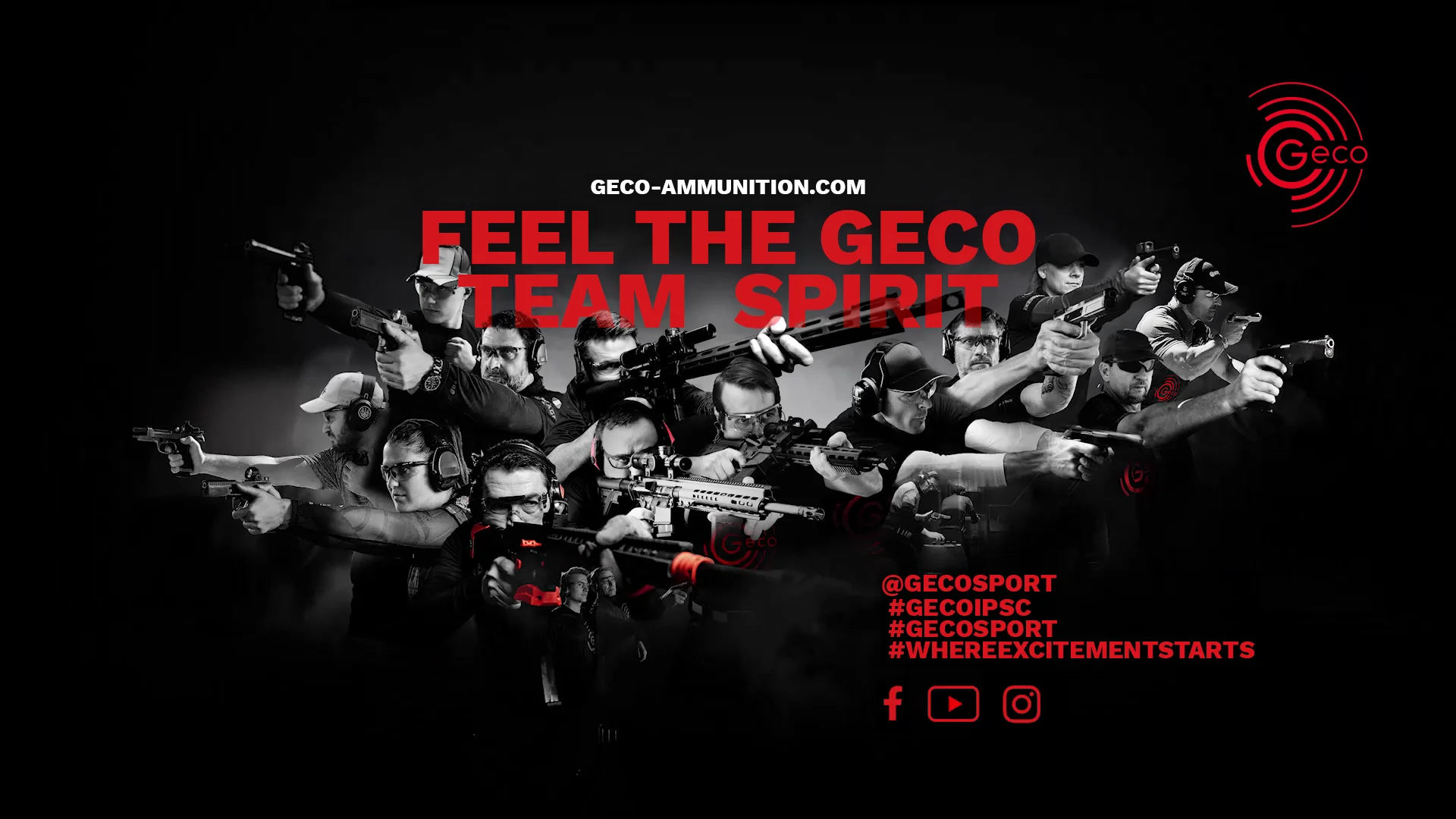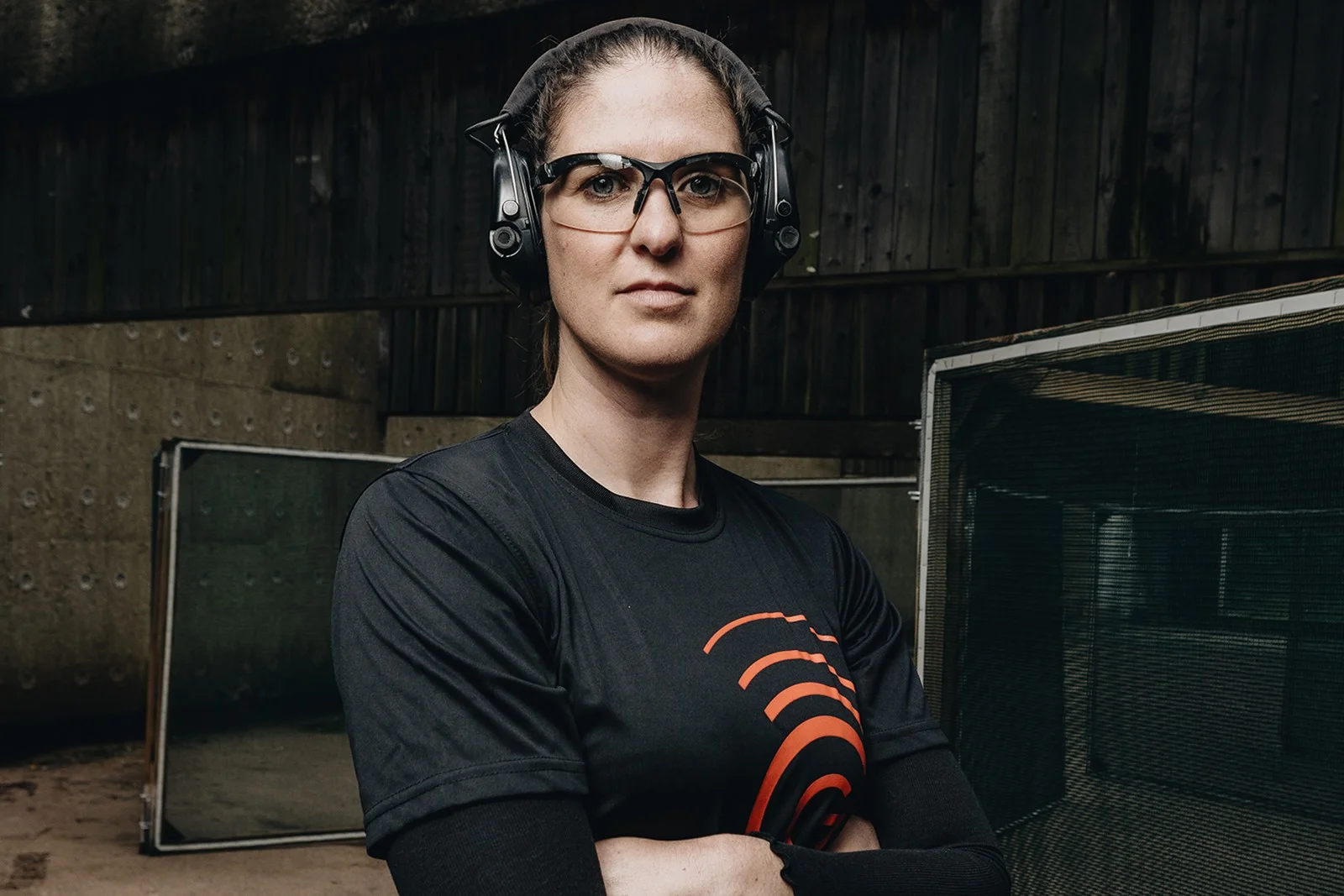
SHOOTING PORTRAIT:
Cyrielle Vivo
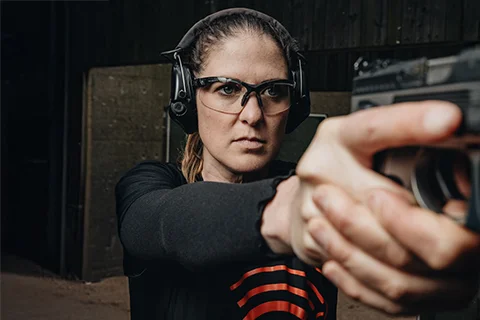
GECO IPSC Team Shooter
Cyrielle Vivo, France
Cyrielle was born in Antibes, southern France, and discovered her passion for sport at an early age. Her first big hobby was swimming, which she pursued intensively for many years to perfect her skills in the water.
At the age of 22, Cyrielle's focus changed and a new hobby emerged when she joined the French police force: shooting. A few years later, in 2016, she specialised in IPSC shooting. In addition to shooting, Cyrielle is now married and the proud mother of a two-year-old son.
Accurate, consistent shooting , always positive
Cyrielle's progression in competitive shooting is marked by notable achievements. After joining the French police force and discovering her interest in shooting, she steadily advanced in her career. In 2018, she was selected to join the French national team, a significant step in her development as a competitive shooter. In 2019, she participated in her first European Championships, gaining important international experience. Her dedication and hard work were rewarded in 2021 when she won her first French championship title.
In June 2022, Cyrielle gave birth to her son, yet she continued to compete at a high level. Within a year, she achieved the title of vice world champion, demonstrating her ability to maintain peak performance even after significant personal milestones. In 2023, she competed in the European Championships again, securing the position of European vice champion in the production lady division. This consistent performance at both national and international levels highlights her skill and commitment to the sport of shooting.
When Cyrielle started shooting, she was characterised by her precise movements. With hard training and continuous improvement, she has increased her speed step by step while keeping her technique consistent and precise.
Cyrielle approaches her sport with an unwaveringly positive attitude, as shooting brings her immense joy. One of the greatest joys of sport shooting for Cyrielle is the strong sense of community. She appreciates the opportunity to meet like-minded people and interact with dedicated organisers and helpers. This shared passion is a great experience and makes shooting something very special for Cyrielle.
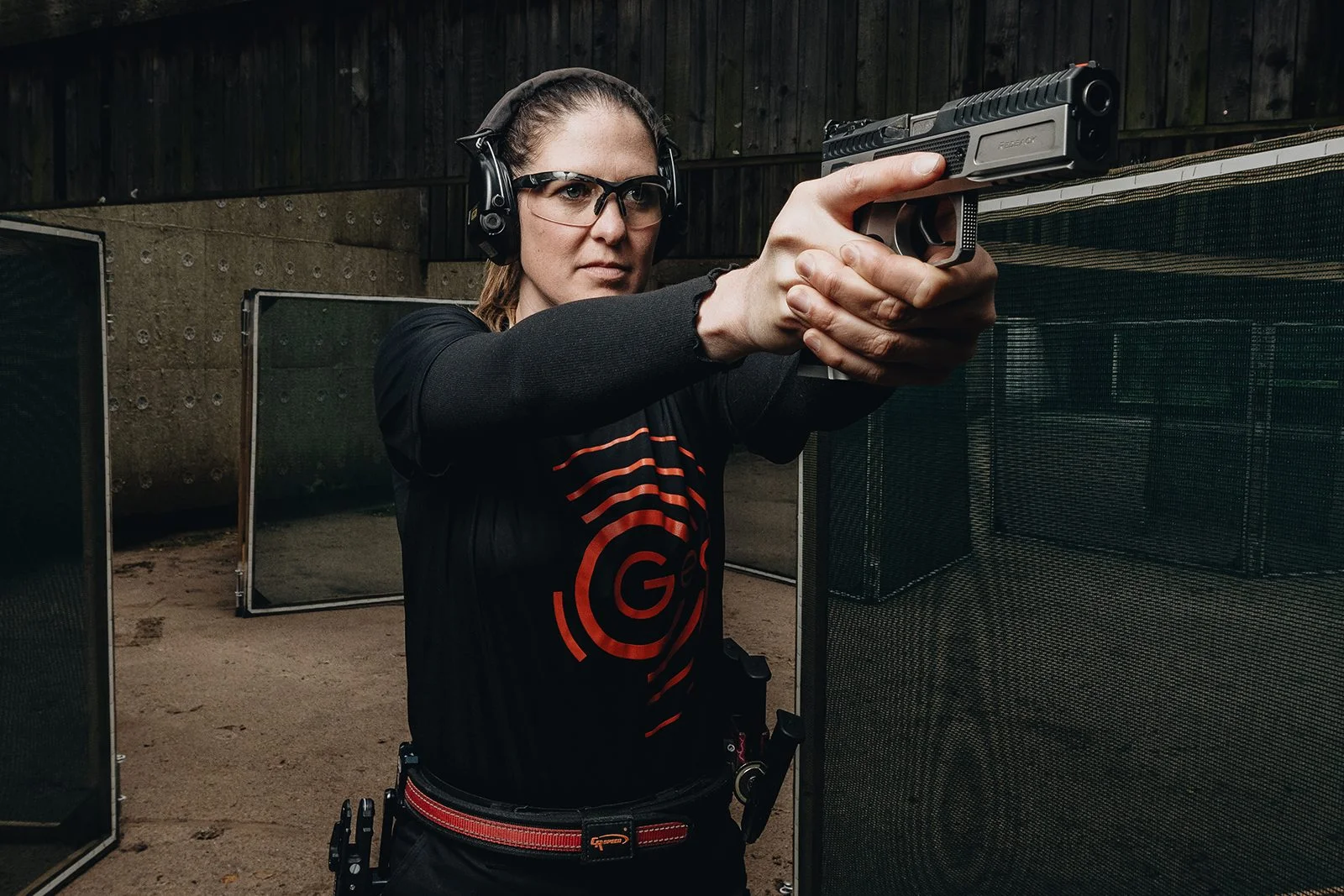
Reliable gear.
"For practice, I use GECO 9 mm Luger 124-Grain ammunition. In competitions, I reload using RS12 powder, 124-Grain full metal jacket GECO bullets, and GECO primers. My pistols of choice are Phoenix Redback 2. The precision of the ammunition is crucial, and this equipment provides everything I need for optimal performance. GECO is renowned for its high-quality, reliable ammunition, which is essential for both practice and competitive shooting. Their products ensure consistent performance, allowing me to focus on improving my skills and achieving my best results."
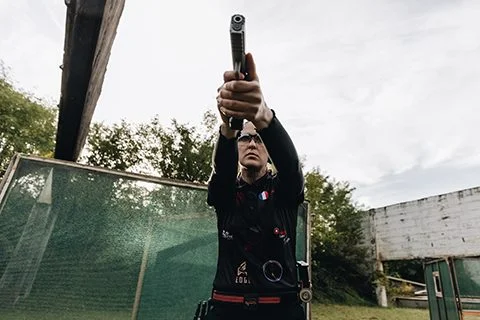
"My fondest memory of a competition was standing on the podium at the World Championships in 2022. Reaching that podium just five months after becoming a mother was a monumental achievement for me, and I am incredibly proud of it. The journey was challenging, but it proved to me that being a young mom and an athlete is absolutely compatible. It was a moment of immense joy and validation, showing that when you truly want something, you find the strength and determination to achieve it, no matter the obstacles."
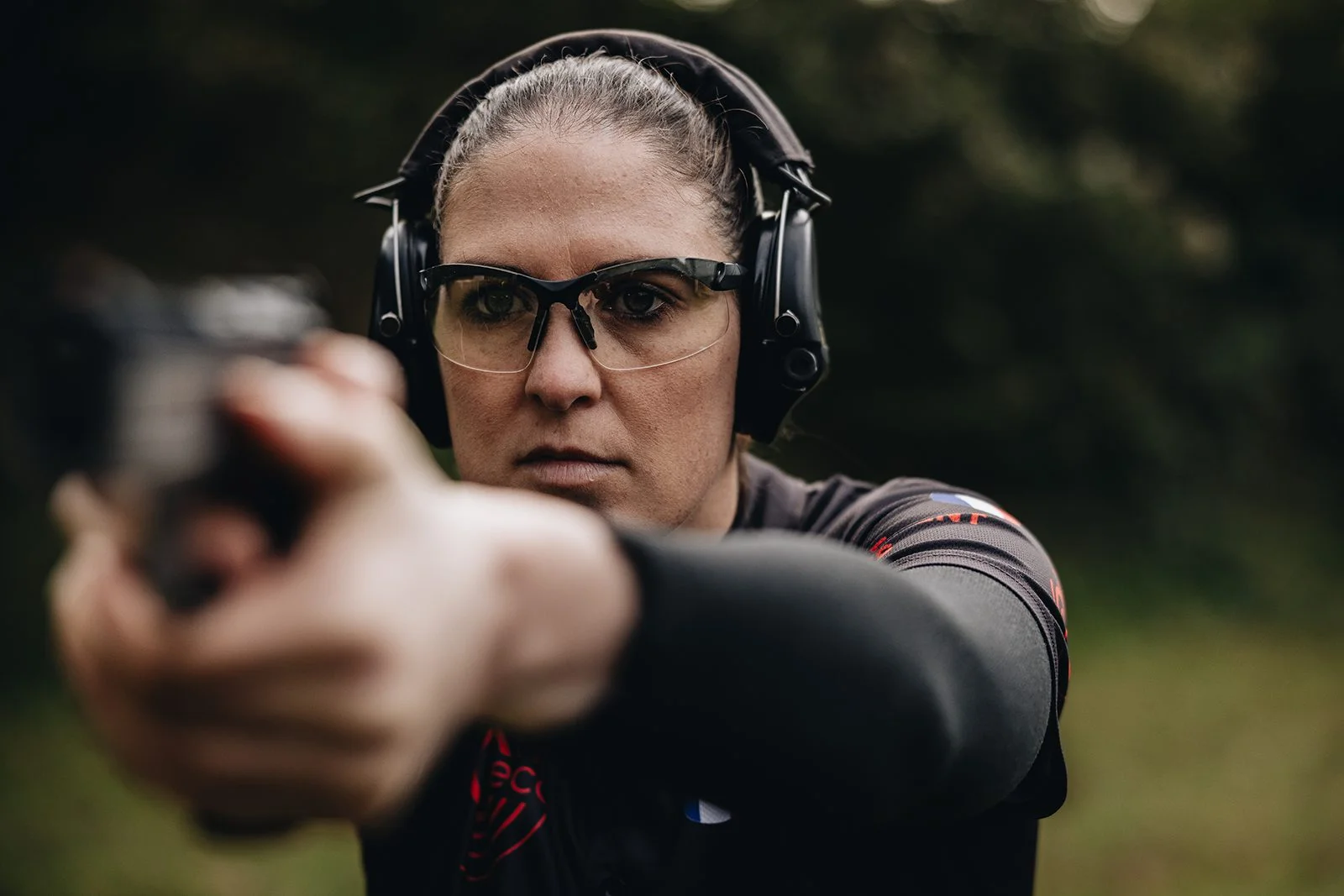
Quick-fire interview with CYRIELLE VIVO – Q&A SESSION
HOW DO YOU PREPARE DURING THE OFF-SEASON?
What do you look for in dry fire training and what areas do you work on? How much time per week do you spend on dry-fire training (weapon handling, target acquisition, changing body positions, different shooting positions, etc.)?
During the offseason, I aim to continue shooting at least once a week. My focus is on practicing IPSC fundamentals and precision shooting during this period. Additionally, I incorporate dry fire practice, especially as major competitions approach. This routine helps maintain my skills and ensures the preparing for upcoming events.
Do you do any physical work? If so, what kind? (Endurance or cardio, strength endurance, maximum strength, speed, agility, coordination exercises, core stabilization, etc.)
I practice sport regularly, running, more often in the form of interval running. Also training in the gym, CrossFit, core stabilization…
What about mental training? What methods do you find most helpful? (Visualization techniques, breathing exercises, etc.)
In 2020, I obtained a university certificate as a mental trainer. I use it during my shooting practice, visualization, goal setting, and managing emotions during competitions…
WHAT INVENTORY CHANGES ARE PLANNED AND WHEN?
Changes to the gun or sights?
I was shooting with a CZ Shadow 2 until 2023. I was lucky enough to be sponsored by GECO and Phoenix in order to obtain new shooting weapons, Phoenix Redback.
Are there straps or other equipment you would like to change/improve?
I‘m fully satisfied with these new guns, they are perfectly balanced, they are very precise and the grip is very ergonomic.
What is your favorite piece of equipment and why?
For me, the grip of the gun is very important, especially when the weather conditions are hot and the hands can slip.
HOW DO YOU OBTAIN AND TEST YOUR AMMUNITION?
If you load your own ammunition, which components are most important to you? Factor, performance/accuracy, recoil?
I occasionally use factory ammunition during competitions or training, but I mostly reload my own to ensure consistency and quality. I use a Dillon 1050 press and GECO components. GECO is renowned for high-quality primers, bullets, and casings, providing reliable performance and precision. Their meticulous manufacturing meets the demands of competitive shooting, allowing me to focus on my technique and performance without worrying about my equipment's reliability.
How much ammunition do you use per year for each firearm?
Ideally, I would like to shoot at least 30,000 rounds of ammunition per year. You have to combine work and sport when you are not professional. Before major world events, this is what it will take to win.
Are you separating training ammunition and special competition ammunition, or do you use one type for everything?
My training and competition cartridges are set up in the same way. Bullet quality is crucial for accuracy, so I ensure that only the highest quality components are used. To avoid any risk of disqualification, my cartridges are meticulously tested and proven to be around 134-power factor, ensuring they function reliably and avoid any percussion problems.
SEASON PLANNING
How many matches do you shoot in a normal year?
I participate in around seven or eight competitions per year, with four international trips.
How many international trips have you planned for the coming year?
There are no major championships this year. I will therefore participate in competitions where my main competitors go in order to confront them. I generally do not take a break when the competition season starts. I group together big training phases just before the big events.
What is your main competition for the coming year?
There will be two important competitions this year for me. Namely the Infinity Open in Germany and the French National.
SUCCESSES AND DEFEATS
What is your motivation to participate in the ISPC sport or what is the special attraction?
I like practical shooting, the IPSC compromise between speed and precision. I also like the confrontation with my competitors and the competition.
What was your most successful/pleasurable competition (last season) and why?
It is the European Championships. It is a competition over several days, you have to stay focused for a long time and be consistent in your results. I like the challenge of big meetings. In addition, I was in a team in my country with Eric Grauffel, the greatest champion of the IPSC, and it is great to shoot as a team with him.
What was your worst competition and why?
The Italian Championship two weeks before, I was not comfortable, I made many mistakes, and I lost confidence, so I slowed down my shooting and my result was not good.
PARTICIPATION IN A COMPETITION
What is your focus during the walkthrough?
I concentrate on my position according to the targets, on memorizing the course, on my magazine changes. Also on the cycle of mechanisms.
How long before the first competition shot do you arrive at the shooting range?
About 45 minutes.
What diet do you follow or how do you keep fit during a competition?
I try to eat from time to time so I do not have cravings.
Do you have a formula/basic attitude for approaching a competition? (Do you focus on speed or hits; do you occasionally push your own limits/step out of your comfort zone or take deliberate risks; do you prefer to be in a team with 'better shooters' or vice versa etc.?)
If it is an important competition, I will aim to be consistent in my results in order to obtain the best result. During basic competitions, I try to push my limits. I do not mind being with good competitors, and that helps me surpass myself.
Which stage elements/designs do you like best, and which ones not so much? (Long courses, short courses, moving targets, memory stages, field courses with lots of running, stages that require good accuracy, spray and pray stages, etc.)
I like long courses with difficult targets where you have to be precise, that is generally, where I perform well.
What wisdom would you give to an IPSC novice or anyone interested in the sport on his or her first day?
To work a lot on precision, it is important to perform.

